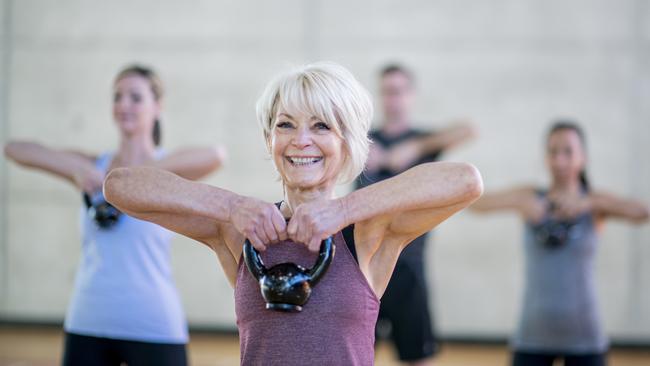Seven ways to boost your brain, and be a cognitive super-ager
The bigger your cognitive reserve the more resilient your mind will be. Here’s the heads up on how to build it.

Are you a cognitive super-ager? Just as you can take steps towards future-proofing your body with a healthy diet and plenty of exercise, so you can enhance your brain’s resilience to age-related disease by boosting what psychiatrists refer to as your cognitive reserve.
Building in good brain maintenance habits incrementally over the years means you can mitigate some age-related damage, potentially reaching landmark birthdays of your twilight years with the cognitive capacity you had in middle age.
Andrew Sommerlad, an associate professor of psychiatry at University College London says researchers are discovering the power of cognitive reserve, and in studies of older people who show signs of Alzheimer’s in their brains but who never exhibit the symptoms it is thought to provide some of the benefits.
“We each have a level of cognitive reserve determined by our brain’s acquired ability to withstand the effects of ageing,” Sommerlad says. “What we see, even in some people whose brains are addled with the hallmarks of Alzheimer’s disease, such as amyloid plaque deposits and slight shrinkage of the hippocampi, is that they cope better with these pathological changes the higher their powers of cognitive reserve.”
Three years ago colleagues of Sommerlad’s at UCL published findings from their English Longitudinal Study of Ageing, in which they tracked 12,280 people in midlife for up to 15 years. They showed that higher levels of cognitive reserve, a consequence of education, jobs that involved strategic, organisational and “thinking’‘ powers, along with lifestyle habits such as exercise, hobbies and a varied social life, are associated with lower levels of dementia.
Dr Dorina Cadar, now a senior lecturer in cognitive epidemiology and dementia at Brighton and Sussex Medical School who was one of the authors of the paper, says that while developing a good cognitive reserve won’t prevent dementia, it can be powerfully protective.
“There are many people with high cognitive reserve who still develop Alzheimer’s disease,” she says. “The difference is that those with high cognitive reserve will be able to mask the symptoms and cognitive deficits for longer because they will be able to compensate for the parts of the brain affected where healthy neurons are dying.”

Its effects are wide reaching. “The more robust your cognitive reserve, the better able you will be to stave off symptoms of degenerative brain changes associated not just with dementia but with other brain diseases, such as Parkinson’s disease, multiple sclerosis or a stroke,” Cadar says. “It will also help you to function better for longer if you are exposed to unexpected life events such as stress, surgery or toxins in the environment as you get older.”
But how do we improve it? Since cognitive reserve is developed through “a lifetime of education and curiosity”, Cadar says, the younger you implement things that will bolster it, the better. Although she adds that it is never too late to start. “Your cognitive reserve is an active mechanism built on cerebral challenges and increased physiology thought to be influenced by challenging the brain’s ability to improvise and find alternate ways of getting something done,” she says.
“It reflects how agile your brain is in pulling in skills and capacities to solve problems, and anything that works on mental flexibility, adaptability and resilience is helpful.” That includes brain apps and puzzles such as crosswords and sudoku that provide your brain with a better repertoire of skills from which to draw. But even reading, doing your tax return or organising a party fires up neuronal pathways, promoting connections between neurons in the brain.
Cadar gets her fix in different ways. She likes to read, and says her brain is exercised as part of her research role.
“But I have a shih tzu dog who has an incredible internal clock for demanding a little attention, time for walking, and she occasionally drags me away from my desk, which does wonders for lowering my stress levels,” Cadar says.
“For better cognitive reserve it is imperative to find your own routine and that little dose of magic that makes you happy and content.”
Here are the best brain maintenance steps to boost your cognitive reserve:

1. Do yoga, t’ai chi or meditate to reduce stress
Too much work or other stress, as you may expect, hurts our cognitive reserve. Any demanding tasks that require prolonged cognitive effort cause our brains to gobble up energy resources.
“Glucose, a vital fuel for brain function, gets depleted,” Cadar says. “Some research discovered that mentally demanding tasks lead to a build-up of certain chemicals that may disrupt brain functioning.” In other words, she says, thinking too hard for too long can wear us out, affecting brain chemistry.
“Successful people learn to balance periods of mental demand with periods of relaxation to release this form of neurotoxicity,” Cadar says. “Mind-body practices like yoga, t’ai chi and meditation promote relaxation and, indirectly, cognitive health.”
2. Plan ahead for early retirement
Just as studies show that having a cognitively stimulating job or career is linked to higher cognitive reserve and mental resilience, retiring from such jobs can lead to a faster cognitive decline.
Studies suggest a lot depends on why you retire, with researchers at Sony Brook University suggesting that people who retired for health reasons experience a steeper drop in scores for verbal memory and verbal fluency than those who retired voluntarily or for family reasons. “Early retirement is not necessarily a bad thing for your brain – provided you keep it active,” Sommerlad says. “So plan ahead to make sure you keep cognitively busy and engaged.”
3. Socialise as much as you can
In his research published this year in Nature Aging, Sommerlad showed the importance of regular social interaction for the brain. He reported on study evidence that shows how greater participation in midlife and late-life social gatherings is associated with 30-50 per cent lower dementia risk.

“You must see friends and try to interact socially with as many different groups as you can, at the gym, at a weekly park run or as part of any hobby, as it really does provide a workout for the brain,” he says.
“Meeting people in any social situation, even a friend for coffee, or a Zoom call with relatives, is cognitively demanding. It requires us to think and react and make judgments, to remember things about people and to make jokes or internally assess responses, all of which exercises the brain.”
4. Get a hearing test every year after 40
There’s a direct connection between hearing and preserving cognitive function. “Research we have done at UCL shows that untreated hearing loss is one of the strongest risk factors for dementia risk,” Sommerlad says. “It is likely to be because you are more socially isolated, less able to engage in interactions with other people and to hear and retain information you are given.”
In July researchers reported in The Lancet that hearing aids are beneficial for people at risk of dementia. “They are difficult for people to get used to, but being stubborn about not wearing them can backfire,” he says.
5. Maintain regular sleep patterns
Typically we get less sleep as we age, but getting too little or too much are risk factors for diminished cognitive reserve. “A few nights of reduced sleep won’t make much difference,” Sommerlad says. “But sleep serves a function as there is a glymphatic clearance in the brain when we are asleep, and the theory is that there is reduced clearance of these harmful products if you don’t sleep well.” Ideally, seven to nine hours is optimal for enhancing cognitive reserve.
“A deep sleep might help buffer against memory loss for older adults facing a heightened burden of Alzheimer’s disease,” Cadar says. “You can think of deep sleep almost like a safe vest that keeps memory afloat, rather than it getting dragged down by the weight of Alzheimer’s disease pathology.” But the worst thing you can do is stress if you don’t get that much. “There are ways we can improve sleep, even in older people,” Cadar says. “Start by improving your sleep hygiene with steps such as avoiding electronic screens, and sleeping in a dark room with minimal distractions.”

6. Get out for a brisk walk, run or lift weights
Exercise has a remarkable impact on cognition, benefiting our memory and thinking skills, and enhancing cognitive reserve in the process. Among other things, it thickens the cerebral cortex and increases brain volume, strengthening the frontal lobes associated with cognition. “In a direct way, it also triggers changes in insulin levels, reduction of inflammation, and the release of endorphins,” Cadar says. “All of these factors contribute, in turn, to cognitive improvement and resilience.”
Indirectly, exercise enhances mood, promotes better sleep and reduces stress and anxiety, all of which boost cognitive function. “Any form of exercise is good for the brain,” she says. “Running, swimming and cycling or regular walking of 30 to 60 minutes a day has been shown to have great benefits for cognitive health, and strength training or resistance exercise improve muscle strength and indirectly benefit brain function.”

7. Listen to music
Putting on your headphones and listening to music - or playing a musical instrument - has been shown to stimulate the production of grey matter (brain tissue packed with synapses and neuron cells), as well as improving neuroplasticity, remodelling of the brain and its connections in response to different experiences, in a group of 100 retired people aged from their early sixties to late seventies.
For the study published in the journal NeuroImage: Reports, a team from the University of Geneva (UNIGE) and other Swiss institutions enrolled participants, none of whom had been actively engaged in musical hobbies prior to the trial, in piano lessons or music awareness training - active listening lessons in which they were taught how to focus on instrument recognition - for six months. Each group had a one-hour weekly session and did half an hour of related music homework each day.
“We wanted people whose brains did not yet show any traces of plasticity linked to musical learning,” said Damien Marie, a research associate at the CIBM Center for Biomedical Imaging at UNIGE and the study’s lead author. “After six months we found common effects for both interventions. Neuroimaging revealed an increase in grey matter in four brain regions involved in high-level cognitive functioning in all participants, including cerebellum areas involved in working memory.”
The Times





To join the conversation, please log in. Don't have an account? Register
Join the conversation, you are commenting as Logout